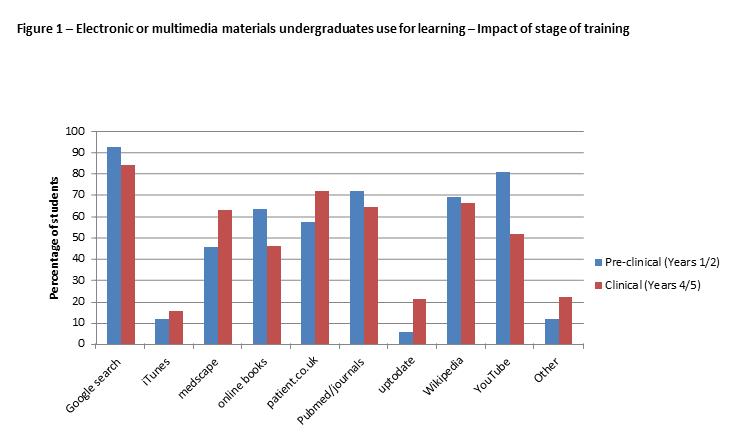


Theme
4BB Teaching tools
INSTITUTION
University of Glasgow - United Kingdom

With advances in technology and increasing access to a wide variety of learning resources online, how medical undergraduates study has changed considerably. How to make most effective use of these resources remains largely unanswered.
Permission was granted by the University of Glasgow for medical undergraduate’s to participate in a survey of the use of educational materials for learning. A 25-item survey was developed and distributed by email eliciting information on students’ use of educational resources. Fisher’s exact and Mann-Whitney U test were used. P<0.05 was taken as significant.
Students continue to find textbooks most beneficial (84%), followed by search engines (52%), podcasts (28%), Wikipedia (28%) and Pubmed or journals (19%). Use of electronic resources differed by stage of training, sex and previous degree. 42% of students usually evaluate the quality of evidence but 31% rarely do. Students who used pubmed/journals were more likely to evaluate the quality of evidence (p=0.008) and students who used Wikipaedia were less likely to (p=0.003). 73% of students base their study on the current topic that week, 68% according to forthcoming exams, and 28% based on patients seen and this differed by stage of training (p<0.001).

Use of electronic learning resources are popular amongst medical undergraduates although textbooks remain the most frequently used and popular resource. Use of resources changes by stage in training suggesting that students are acquiring study skills throughout their degrees.
Medical students require guidance throughout their course as to effective use and critical appraisal of learning resources and this is something that should be included by course designers.
We greatly appreciate the work of Dr Boyle in creating and running a Student Selected Component (SSC) in ‘Research in Medical Education’.
 Send Email
Send Email